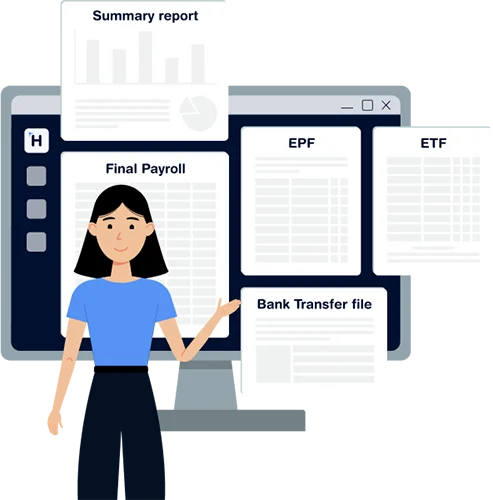Payroll reconciliation is like a financial detective that makes sure everything lines up precisely, reveals any discrepancies, and guarantees that employee payments are accurate and consistent with the big picture of finances. While payroll reconciliation may appear to be a specialized term reserved for accountants and number crunchers, its importance goes far beyond a set of figures on a spreadsheet. It has the authority to protect employees’ hard-earned salaries, ensure regulatory compliance, and foster an environment of trust and transparency within organizations. In this article, we unravel the importance of payroll reconciliation and its value for businesses.
What is payroll reconciliation?
Reconciling payroll is like fitting a puzzle together. You first gather the payroll figures from the previous month. Then, you add up any alterations that have taken place since then, such as wage changes or deductions. If the sum of these modifications equals the amount you calculated for the current month’s payroll, the payroll is reconciled. This process involves verifying the accuracy of payroll calculations, confirming that all necessary deductions and taxes are applied correctly, and reconciling payroll figures with other relevant financial accounts.
How do payroll reconciliation reports help you?
The payroll reconciliation report is the documentation of the reconciliation procedure. This document offers a summary and analysis of the reconciliation process and its findings. The report includes an in-depth review of the actions taken during the reconciliation process as well as its findings. The report offers an overview of the actions taken during reconciliation, any inconsistencies or errors discovered, adjustments made, and recommendations for correcting any issues or improving payroll operations. It is a great resource for auditors, management, and stakeholders assessing the financial accuracy and integrity of the payroll process.
What are the steps involved in payroll reconciliation?
- Collect Payroll Data: Gather all relevant payroll data, such as employee time records, pay scales, tax deductions, benefits, and any other elements of the payroll.
- Calculate Payroll Totals: Using the information gathered, calculate the overall sum that will be paid to each employee. Aspects like regular pay, overtime, bonuses, deductions, and employer contributions should be considered.
- Compare Payroll Records: Compare the payroll totals that were calculated with the records that were provided by the payroll system or provider. Verify the figures’ accuracy and that all required components are included.
- Identify Discrepancies: Check the payroll records to find any discrepancies or differences between the calculated totals and the records kept by the payroll system. This may entail looking for omitted data, inaccurate calculations, or any other errors.
- Resolve Discrepancies: Investigate and fix any discrepancies you find. Ensuring accurate payroll figures may necessitate reviewing the original records, speaking with employees or relevant departments, and making the necessary corrections. Any adjustments made throughout the reconciliation process should be recorded.
How Humanised Payroll helps you in payroll reconciliation?
Integration and automation: Various systems, including time and attendance, employee benefits, and tax withholdings, are integrated with Humanised Payroll software. This data is automatically gathered and processed, lowering the possibility of mistakes or omissions during reconciliation.
Data Validation and Error Detection: The software performs real-time data validation checks to ensure accuracy and completeness. It identifies any inconsistencies or duplicate entries, alerting the user to potential errors that need to be resolved.
Reporting and Analytics: Humanised payroll software generates comprehensive reports and analytics to facilitate reconciliation. It generates detailed payroll summaries, tax reports, EPF, and ETF reconciliation files which are compatible with relevant platforms and make it easier to compare and verify data between different periods.
Historical Data Access: Humanised payroll software stores historical payroll data, allowing payroll administrators to access and compare information from previous pay periods. This feature helps identify trends, patterns, and discrepancies aiding in the reconciliation process.
Compliance and Regulations: Humanised payroll software stays up to date with the latest tax laws, labor regulations, and compliance requirements. It automatically applies necessary updates to tax rates, deductions, and other payroll-related regulations, ensuring accuracy and compliance during reconciliation.
Collaboration and Documentation: The software enables collaboration between payroll administrators, HR teams, and finance departments. It provides a platform to document and track reconciliation activities, record adjustments, and explanations, and maintain an audit trail for future reference.
What happens if you don’t reconcile the payroll?
Failing to reconcile payroll data can lead companies to some drawbacks. Here are some of those.
1. Inaccurate financial reporting: Payroll reconciliation helps to ensure that employee wages, taxes, and other related expenses are accurately recorded in the company’s financial statements. Without proper reconciliation, financial reports may contain errors, leading to inaccurate financial analysis, misleading stakeholders, and potentially violating accounting standards.
2. Employee dissatisfaction and morale issues: Incorrect payroll can cause problems for employees, such as underpayments, overpayments, or delays in receiving wages. Such errors can lead to frustration, financial stress, and diminished employee morale. It can also harm the company’s relationship with its workforce, affecting productivity and overall employee satisfaction.
3. Tax liabilities and penalties: Improper payroll reconciliation can result in inaccurate tax calculations, such as underpaying or overpaying employee taxes or failing to remit employer taxes. This can lead to tax liabilities, penalties, interest charges, and potential legal ramifications. Employees may also file complaints or legal claims for unpaid wages or tax discrepancies.
Conclusion
In conclusion, payroll reconciliation plays a crucial role in ensuring accuracy, compliance, and trust within organizations. By thoroughly reconciling payroll data, companies can identify and rectify discrepancies, safeguard employee salaries, and maintain regulatory compliance. The payroll reconciliation report serves as valuable documentation of the process, providing insights and recommendations for improving payroll operations. Failing to reconcile payroll can have negative consequences, including inaccurate financial reporting, employee dissatisfaction, and potential tax liabilities and penalties. Implementing humanised payroll systems with integration, automation, data validation, and reporting capabilities can greatly streamline the reconciliation process.

